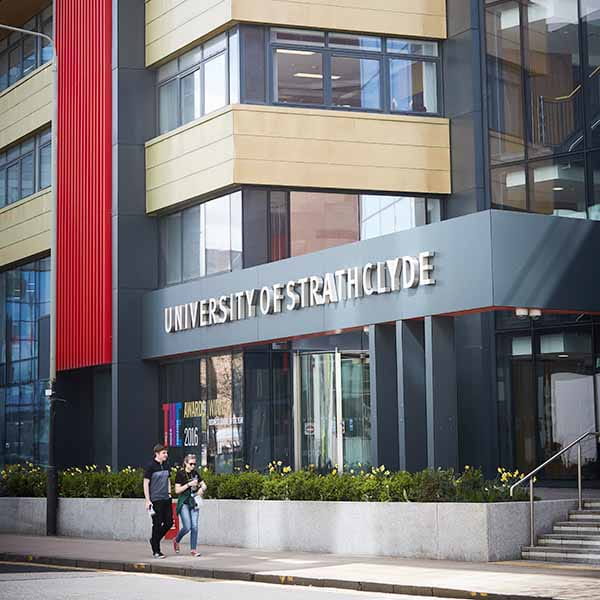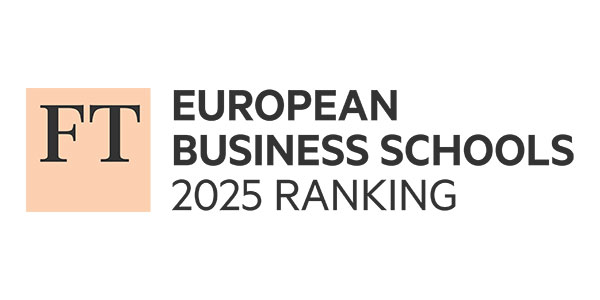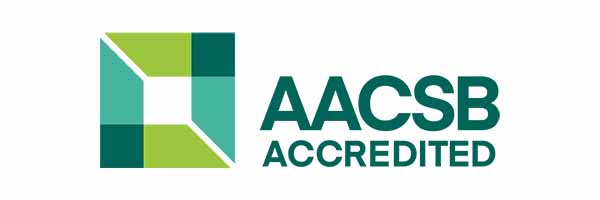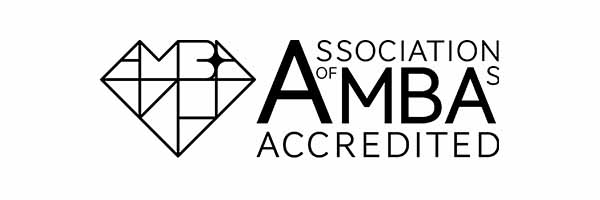MIBML International Business with a Modern Language
ApplyKey facts
- UCAS Code: NR19
- Accreditation: triple-accredited Business School - AACSB, EQUIS, AMBA
Study abroad: exchange links with universities worldwide
Applicant visit days: these take place in March each year
Study with us
- gain the skills to succeed in a complex and ever-changing global business environment
- study abroad at one of our partner institutions in Europe, South East Asia, Australasia or North America
- boost your career prospects, with an understanding of international business from another country’s perspective
- develop skills which are highly valued by graduate recruiters through our innovative Management Development Programme
The Place of Useful Learning
UK University of the Year
Daily Mail University of the Year Awards 2026
Scottish University of the Year
The Sunday Times' Good University Guide 2026
Why this course?
International Business with a Modern Language will give you great exposure to the international business environment along with study of a language.
It's a five-year Masters-level degree for students who want to gain a firm business foundation while developing the ability to do business in a foreign language.
It will develop your knowledge and understanding of international business while preparing you for a business career with management potential.
A year abroad means you'll become fluent in the language and give you the confidence to do business overseas in other cultures.


What you’ll study
Years 1, 2 & 3
These years focus around core classes in International Business and the Management Development Programme. You’ll also choose a language to study.
Year 4
You’ll spend this year in a business school in the country of your chosen language. All classes are taken in the foreign language.
Year 5
You’ll take the core business class Contemporary Issues and Trends in International Business, your business specialism and your language. There’s also an in-depth research project.
Languages
You can choose one from French or Spanish.
Specialising
You can choose to specialise in the following business subjects:
- Business Analysis & Technology
- Business Enterprise
- Economics
- Finance
- Hospitality & Tourism Management
- Human Resource Management
- Marketing
Study abroad
You'll spend year 4 either studying or working in the country of the language you choose.
Postgraduate study
This course runs for five years and is now an Integrated Masters degree. All classes will be assessed at postgraduate level.
Guest lectures
During your final year of study, you'll attend the Contemporary Issues and Trends in International Business class where you'll have the opportunity to attend a series of guest lectures delivered by high calibre practitioners from both national and international organisations.
Course content
You'll take modules in International Business and your chosen business specialism, alongside a modern language. In year 1 you can take two modules, covering four business school subjects. At the end of Year 1, you'll choose which subject to take forward as your specialism.
The Management Development Programme is also a core element of the undergraduate programme in the Strathclyde Business School. The programme runs for the first three years of the BA degree and is driven by real business problems. The approach to learning is active problem-based, with students working in project teams.
The Management Development Programme provides an opportunity to integrate the knowledge and experience gained from your business subjects. Each year of the Management Development Programme focuses on different aspects of business and the content is constantly evolving, and being updated and enhanced.
In addition to these modules, you'll also study two foundation business modules and two modules in your chosen modern language.
Introduction to International Business
This module introduces learners to the field and practice of international business and management.
Drawing on classical and recent debates in theory and practice including, but not limited to commercial concerns, learners will be equipped with an understanding of the foundational principles and developments of the subject.
In the module, we consider how international business and management is researched, and facilitate a critical understanding based on real-life case studies in international contexts.
This module gives learners the capacity to look at the past, present and future in organisations and provides the foundations for intellectual progression in the subject, and broadly, for Year 2 and beyond.
Management Development Programme 1
The ICE Pathway - “Innovation, Commercialisation & Entrepreneurship”, where you'll learn about the Foundations of 'What is Business’. Alongside:
- Personal & Professional Development: Who am I? How Do I learn? How do I lead & work in a team?
- Knowledge & Practice: What is a business/organisation? Why does this matter? How does this affect society?
- Experiential Learning: Real-world cases & clients; team-based and student-centred Learning approaches
Academic Skills
This class aims to support you in developing key skills that are important to both your academic and future career. These include skills associated with:
- research
- data analysis
- critical writing
- team working
- communication
International Business Analysis
This class furthers the foundation learning covered in the first year. It gives you a grounding in the historical context of international business, global institutions, theories underpinning international trade and investment, and the main decision criteria, considerations and options facing the firm or organization that is, or is wishing to, operate internationally.
Management Development Programme 2
Topics
Semester 1 topics include:
- Working in Business Organisations
- Working Business Research & Consultancy
- Working Internationally
- Working in the Third Sector
- Rhetorics & Oratory
Semester 2 is about developing the proposal of Management Development Programme 3; with a presentation and a final report.
Class description
The second year concentrates on developing understanding through industry-specific contextualisation. Sessions are weekly and three hours in length.
The sessions are thematically linked to the pathways for individualised experience in third year whilst also drawing on the theoretical knowledge developed in Management Development Programme 1. In order to develop understanding, organisations will deliver a half-day session. This consists of a one hour plenary introduction where the company and case study are introduced. This is followed by the group sessions where you undertake activities in relation to the case study set by the company.
Managing Across Cultures & Frontiers
This class builds on the theories and concepts introduced in Managing in a Global Context in year 1 and International Business Analysis in Year 2. It does so by focusing more on the complex cross-cultural and human resource issues associated with the implementation of international business practice and strategies.
Management Development Programme 3
The third year of centres on individualised experience in an organisational context through one of the following pathways:
- Internship/Charities - gain practical experience in a private or third sector organisation. You need to negotiate and locate your own organisation and experience – this is one of the key learning points of the pathway.
- Research and consultancy - a facility for local small businesses to gain from the experience and expertise of those within Strathclyde Business School. You work on two live business consultancy projects (one in each semester) and, as a team of six, develop solutions and strategic initiatives for the local SME economy.
- International experience – only available for students who are undertaking an international exchange for either one semester or full year.
- Vertically Integrated Projects - working on a cross-faculty basis to research longitudinal projects (including the ‘Bill Gates Toilet Challenge, Solar Panels for Gambia and Enterprise in Schools) you work with a team of students from all levels of study (first year undergraduate to final year PhD) to further the work of the project.
In addition, you’re required to undertake a social responsibility element (this accounts for one quarter of the overall workload).
These have been designed to provide support to the Curriculum for Excellence and the Widening Access to Higher Education programme. There are no formal classes for Management Development Programme 3 although there is pathway support with the pathway leads and tutor support.
International Exchange
In addition to this class, you'll also study one class from your principal subject area and two language classes. You'll also undertake your dissertation this year which should have a strong international business context.
Contemporary Issues & Trends in International Business
This class aims to introduce you to a range of contemporary issues impacting on business organizations and managers operating in an international context. It encourages you to think critically about recent trends and issues and will provide you with a range of conceptual models and analytical tools appropriate to the changing landscape of international business.
Triple-accredited business school

The year abroad that you have in 4th year has been a particular highlight of my degree. I spent a year studying at a prestigious business school in Nantes, France and found it was especially valuable in advancing my language skills and understanding of living/working in a different culture.
Learning & teaching
The course is taught by Strathclyde Business School and the Faculty of Humanities and Social Sciences.
Within the Business School, our international partners also contribute as guest lectures and in business games.
Language teaching is specially designed for students on this course and focuses on language for business.
The innovative and highly acclaimed Management Development Programme (MDP) is at the core of our undergraduate degrees in the Business School and comprises a series of classes which you take throughout Years 1 to 3.
You develop knowledge and skills in key areas of management, and team-working, communication and decision-making skills, all of which are highly sought-after by employers.
Major employers and alumni from all sectors are involved in the MDP, participating in group sessions, observing student presentations, and providing feedback. Organisations involved include Barclays, Deloitte, Procter & Gamble and Ernst & Young. In first year the best teams are selected to present to senior staff in one of the sponsoring organisations, and there are prizes for the best projects.
The programme builds your confidence and entrepreneurial capabilities and promotes awareness of globalisation and ethical issues in personal and business decision-making. In Year 3, you develop your own pathway from internships, involvement with business projects, engagement in interdisciplinary activities and business clinics.
Assessment
You’ll be assessed through case studies, presentations, written and oral exams, projects and the Masters research dissertation.

Chloe Pearson
I have learnt an unbelievable amount about the French language and culture which I never imagined I would have known at such an early stage in my degree. I was recently in Paris with friends, and being able to understand French immensely helped us and was quite satisfying.

Nathan Epemolu
I decided to study at Strathclyde because I already knew the business school was the best in Scotland, but it was the progressive outlook of the languages department that really made me commit. I liked the idea of having something general but exciting for a degree, I still don't know exactly what I want to do as a job, but I like the modules I'm taking though I think this is a good step for me.

Niall Rachman
I’ve just graduated – I’ve just started my own business and I’m utilising the skills developed both through business and languages in order to make the business succeed.

Greg Kennedy
Participating in Strathclyde’s Management Development Programme enabled me to work with large organisations such as Barclays, Morgan Stanley and EY, as well as small businesses local to Glasgow. I was able to apply the knowledge gained from theory to practical business cases, to develop skills for my future professional career.
Entry requirements
Required subjects are shown in brackets.
Deferred entry not normally accepted.
| Highers |
(Higher English B; Maths National 5 B; Higher A/B in language to be studied)
(English B, Spanish or French B and Maths National 5 B) |
|---|---|
| A Levels | ABB-BBB (GCSE English Language 6/B or Literature 6/B, or an essay-based A Level B may be considered in lieu of English; GCSE Maths 6/B; A Level B in language to be studied) |
| International Baccalaureate | 32-30 (no subject below 5 and including English SL5, Maths/Maths Studies SL5) |
| HNC/HND | Relevant HNC/HND, A in Graded Units; language qualification in language to be studied; year 2 entry not offered |
| International students | View the entry requirements for your country. |
*Standard entry requirements
Offers are made in accordance with specified entry requirements although admission to undergraduate programmes is considered on a competitive basis and entry requirements stated are normally the minimum level required for entry.
Whilst offers are made primarily on the basis of an applicant meeting or exceeding the stated entry criteria, admission to the University is granted on the basis of merit, and the potential to succeed. As such, a range of information is considered in determining suitability.
In exceptional cases, where an applicant does not meet the competitive entry standard, evidence may be sought in the personal statement or reference to account for performance which was affected by exceptional circumstances, and which in the view of the judgement of the selector would give confidence that the applicant is capable of completing the programme of study successfully.
**Minimum entry requirements
Contextual Admissions for Widening Access
We want to increase opportunities for people from every background.
Strathclyde selects our students based on merit, potential, and the ability to benefit from the education we offer. We look for more than just your grades. We consider the circumstances of your education and will make lower offers to certain applicants as a result.
University preparation programme for international students
We offer international students (non-UK/Ireland) who do not meet the academic entry requirements for an undergraduate degree at Strathclyde the option of completing an Undergraduate Foundation Programme in Business and Social Sciences at the University of Strathclyde International Study Centre.
Upon successful completion, you can progress to your chosen degree at the University of Strathclyde.
International students
We've a thriving international community with students coming here to study from over 140 countries across the world. Find out all you need to know about studying in Glasgow at Strathclyde and hear from students about their experiences.

Fees & funding
All fees quoted are for full-time courses and per academic year unless stated otherwise.
Fees may be subject to updates to maintain accuracy. Tuition fees will be notified in your offer letter.
All fees are in £ sterling, unless otherwise stated, and may be subject to revision.
Annual revision of fees
Students on programmes of study of more than one year (or studying standalone modules) should be aware that the majority of fees will increase annually.
The University will take a range of factors into account, including, but not limited to, UK inflation, changes in delivery costs and changes in Scottish and/or UK Government funding. Changes in fees will be published on the University website in October each year for the following year of study and any annual increase will be capped at a maximum of 10% per year. This cap will apply to fees from 2026/27 onwards, which will not increase by more than 10% from the previous year for continuing students.
| Scotland | To be confirmed. Fees for students domiciled in Scotland are subject to confirmation by the Scottish Funding Council. Scottish undergraduate students undertaking an exchange for a semester/year will continue to pay their normal tuition fees at Strathclyde and will not be charged fees by the overseas institution. |
|---|---|
| England, Wales & Northern Ireland | £9,790 Fees for students domiciled in the Rest of the UK are subject to Parliamentary approval. |
| Republic of Ireland |
If you are an Irish citizen and have been ordinary resident in the Republic of Ireland for the three years prior to the relevant date, and will be coming to Scotland for Educational purposes only, you will meet the criteria of England, Wales & Northern Ireland fee status. For more information and advice on tuition fee status, you can visit the UKCISA - International student advice and guidance - Scotland: fee status webpage. Find out more about the University of Strathclyde's fee assessments process. |
| International | £22,750 |
| University preparation programme fees | International students can find out more about the costs and payments of studying a university preparation programme at the University of Strathclyde International Study Centre. |
| Additional costs | International studentsInternational students may have associated visa and immigration costs. Please see student visa guidance for more information. International BusinessCourse materials & costsEssential textbooks are approximately £200 per year. However, there will be a minimum of 2 copies of textbooks in the main library. Other costs
Study abroadTuition fees continue to be paid to Strathclyde while students are on exchange, and students do not pay tuition fees to the host institution. However, students are responsible for their own travel and living expenses (such as flights, insurance, visa application, vaccinations/associated medical costs, accommodation, food, textbooks). Students are eligible to apply for a student loan as usual, but must let the award agency (for example, SAAS) know that they will be working or studying overseas on a compulsory exchange. Students are eligible to apply for a student loan for their exchange year, but must let the award agency (for example, SAAS) know that they will be studying or working overseas on a compulsory exchange. Currently, SAAS will reimburse certain costs associated with compulsory exchange (for Scottish students). Rest of UK, European and International students should check with their funding provider or home country for similar schemes. Students may be eligible for other external funding, however this is not guaranteed. Modern LanguagesCourse materials & costsThe majority of course materials are available to students via Virtual Learning Environment (VLE). Students can print course materials at their own expense. The cost of course texts does not normally exceed £30 per academic year. Key language texts are used over 2 or 3 years of study. Multiple copies are also available in the University Library. |
| Available scholarships | Take a look at our scholarships search for funding opportunities. |
Please note: All fees shown are annual and may be subject to an increase each year. Find out more about fees.
How can I fund my studies?
Students from Scotland
Fees for students who meet the relevant residence requirements in Scotland, you may be able to apply to the Student Award Agency Scotland (SAAS) to have your tuition fees paid by the Scottish government. Scottish students may also be eligible for a bursary and loan to help cover living costs while at University.
For more information on funding your studies have a look at our University Funding page.
Students from England, Wales & Northern Ireland
We have a generous package of bursaries on offer for students from England, Northern Ireland and Wales:
You don’t need to make a separate application for these. When your place is confirmed at Strathclyde, we’ll assess your eligibility. Take a look at our scholarships search for funding opportunities.
International Students
We have a number of scholarships available to international students. Take a look at our scholarship search to find out more.
Glasgow is Scotland's biggest & most cosmopolitan city
Our campus is based right in the very heart of Glasgow. We're in the city centre, next to the Merchant City, both of which are great locations for sightseeing, shopping and socialising alongside your studies.
Careers
Graduates with international business knowledge and language and cultural fluency are in demand. This is especially true as international trade and global commerce become more important,
Recent graduates have been recruited by major firms such as Accenture, Dresdner Kleinwort Benson and Kleenex.
Apply
Start date: Sep 2026
International Business with a Modern Language
Contact us
Have you considered?
We've a range of undergraduate courses similar to this one which may also be of interest.





